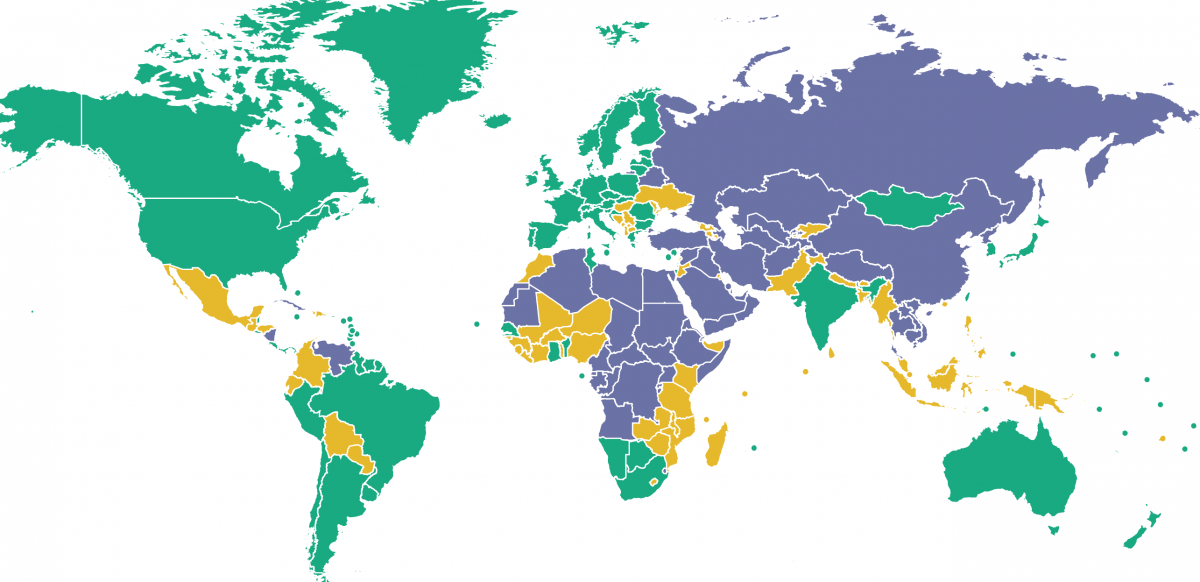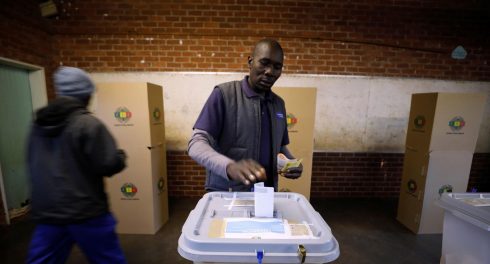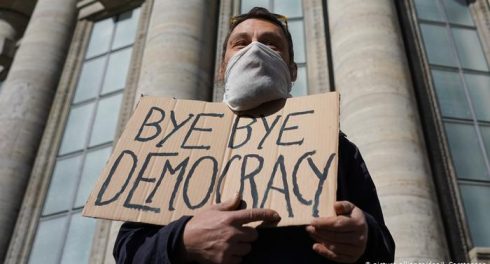Highlights:
- On the backfoot
- Can the grassroots save us?
- Budgets to the rescue?
- Caught in a closing net
- Keep the faith
- Vive la mini public!
- Get out of your box
- TAI Spotlight: From more privacy talks to defence of human rights
In case you missed it…
On the backfoot
 Photo: Freedom House
Photo: Freedom House
Our thread this week is on threats to democracy, spurred by the latest Freedom in the World Report 2019. There is little ambiguity in the headline – despite some unexpected openings from Armenia to Ethiopia, 2018 was the 13th consecutive year of declining freedom in the 195 countries and 14 territories covered. Democracy is in retreat.
Can the grassroots save us?
While democracy may be under pressure, civic movements are inspiring many to rally, whether it be on tax justice or women’s empowerment. While collating funding support and other challenges have been constraining, many campaigns have been surprisingly effective. Natalia Shapovalova from Carnegie Europe offers us a case in point revisiting Ukrainian grassroots activism five years after Euromaidan. A good number of local Ukrainian activists are beating the odds and holding officials accountable. These past weeks we saw thousands of protestors peaceably in the streets in Venezuela. But is grassroots activism always a success? Richard Youngs argues no – most protests achieve mixed results. They may win some success yet fail to secure everything they set out to achieve. Time to manage expectations accordingly.
In the meantime, CSOs from Europe can now access a collaborative, knowledge-sharing online tool to help them keep guard of the state of civic space by gathering together alerts from CSO, existing analyses and institutional resources.
Budgets to the rescue?
If the grassroots alone can’t save democracy, what about smarter taxation and better budgets? Building on David Lewis’ exploration of fiscal institutions resisting state capture last week, now Paolo de Renzio makes the case for putting the public back in public finance build around four interlinked pillars of equity, sustainability, effectiveness, and inclusion. (Part of our ongoing Fiscal Futures series with International Budget Partnership and Carnegie Endowment).
In the meantime, Charles Davidson’s interview with Louise Shelley reminds us how money laundering and illicit trade undermine democracy. Talking of which, Danske Bank money laundering woes continue. France is now the fifth country to open fresh investigations over $230 billion money laundering allegations. Following this scandal and many others, the EU has set up a committee to come up with proposals for new EU legislation to combat financial crime. America too is battling its wars on this front but Franklin Foer argues it is a self-inflicted pain with the cure found in recognizing and curbing corruption.
Learning from Danske bank scandal, Germany does not want to take chances. To tighten all loose ends: a new directive has been released that requires advisors and taxpayers to disclose transactions to the national tax authorities on not just cross-border, but also domestic transactions. This latest signal of a German cultural shift to greater openness is not without contention – introduction of mandatory disclosure rules applied to purely national tax arrangements remains highly controversial among the coalition parties.
Caught in a closing net
What else is undermining democracy? On the one hand big tech data monopolies and on the other governments tightening controls on the internet and social media use.
Developing countries have tended to be somewhat at the mercy of big tech, but as Mike Pisa notes are seeking more control over how firms use their citizens’ data. Attention to issues, such as data privacy, is a welcome step. The need is clear. The Pathways for Prosperity Commission has emphasized that “few developing countries have a clear approach to [the] foundational question of digital governance and even fewer, if any, have a clear approach to regulating digital design and user protection.” Yet could new policies that put the open nature of the internet at risk?
Those worries will not be allayed by developments in Nigeria. With just four days until the general election, there are intensifying fears of an internet shutdown — though the government has denied the possibility. The (justifiably) paranoid need only look to recent events in Congo and globally. Who would most feel the pain of a shutdown? Apparently Filipinos, as they top world internet usage logging a rather astonishing 10 hours a day average online.
Sticking with data protections, last week we flagged initial corporate fines for violating the EU General Data Protection Regulation (GDPR). But what of implications for civil society? OSF (TAI member) and Data Protection Support & Management (DPSM) are investigating the impact that the new law has had on CSOs and grant-making organizations, some of whom have reported difficulties in understanding or complying with certain requirements. There have also been government attempts to “weaponize” the GDPR, for example in Bulgaria where the government has attempted to use data protection law to silence journalists reporting on high-level corruption. To understand the impacts of the GDPR on CSOs and funders – positive and negative – DPSM and OSF have launched a survey. Share your experiences!
Finally, a new deal between the UN’s World Food Programme and Palantir to share highly sensitive data about aid recipients has elicited mixed reactions. Does the WFP know what it is getting itself into?
Keep the faith
The African Data Revolution Report 2018 is out. What’s needed to make good on the promise? A stronger commitment of political leadership and for externally funded data projects to focus more on local capacity-building within governments.
Those same recommendations might apply to other areas beyond open data. Certainly, governance challenges remain significant on the continent. The Ibrahim Index of African Governance overall score is just 49.9%. How can we improve from there? Vera Songwe, Executive Secretary of the Economic Commission for Africa argues that rule of law, transparency, and accountability might be the solution.
Essential Listening
 How to tax the rich? Can’t get enough of Rutger Bregman after the last TAI Weekly? Listen here as he talks to the Economist and read here as he and Winnie Byanyima talk to philanthropy critic Arvind Giridharadas.
How to tax the rich? Can’t get enough of Rutger Bregman after the last TAI Weekly? Listen here as he talks to the Economist and read here as he and Winnie Byanyima talk to philanthropy critic Arvind Giridharadas.
Vive la mini public!
Our final potential savior for democracy? Better evidence on how to promote it that can counter rising distrust and disinformation. Jonathan Breckon and Anna Hopkins make a case for how mini publics could be used as platforms for citizens to engage with research. What is a mini public you ask? Forums that bring people and evidence together for constructive, considered debate. They should draw on systematic reviews that look at all the accessible evidence, presented in a fair and accessible way, rather than rely on experts alone.
Get out of your box
Australian Evaluation Society looks at how to “un-box” evaluation, making it more useful and accessible to frontline beneficiaries and communities.
Thinking of how to create better policies writ large for your organization? You might want to try design thinking.
Lastly, grab some ideas on how to improve your style guide and how to use precise and dignified language to tell truthful grantee stories. Become an authentic storyteller. (For more tips, don’t forget our story behind the story report.)
TAI spotlight
Why the privacy conversation needs more voices | Ford Foundation
Wilneida Negrón makes a case for the need for collaborative forces to fight privacy issues.
Aid budget and investing in the developing world | DFID
Penny Mordaunt calls upon more funders to invest in Asia and Africa.
Protecting and advancing human rights | MacArthur Foundation
MacArthur in a new initiative commits an additional $15 million to support Mexico’s CSOs and protect human rights and reform the nation’s justice system.
Calls: Proposals, papers, speakers and course invites
- OECD and OGP Call for Innovative Open Government Cases – February 12
- Open Heroines Call for Applications for Travel Grants to OGP Summit 2019 – February 14
- Call for conference presentation and workshop proposals for aes19 – February 18, March 7
- Engaging with Civil Society in Belarus Call for Proposals – March 7
On the calendar
- Early Market Engagement for a Multi-donor Funded Evaluation of OGP – Feb 14, 2019
- Data on Purpose Conference – February 19-20 (Stanford, CA)
- Story Movements 2019 – March 1 – 2, 2019 (Washington, DC)
- Open Data Day – March 2, 2019
- The Surprising Power of Liberating Structures – March 11 – 12, 2019 (Seattle, Washington)
- Open Gov Week – March 11 -17, 2019
- The Liberating Structures global gathering – March 13 -15, 2019 (Seattle, Washington, USA)
- TICTec Research Conference – March 19-20, 2019 (Paris, France)
- OECD Global Anti-Corruption and Integrity Forum – March 20-21 (Paris, France)
- The CEP Conference – May 7-9, 2019 (Minneapolis, USA)
- Csv, conf, v4 – May 8-9, 2019 (Eliot Centre, Portland)
- Collective Impact Forum Convening – May 14-16, 2019 (Chicago, USA)
- 2019 Open Government Partnership Global Summit – May 29-31, 2019 (Ottawa, Canada)
- RightsCon Tunis – June 11-14, 2019 (Tunis, Tunisia)
- Global Conference on Transparency Research – June 26 – 27, 2019 (Rio de Janeiro, Brazil)
- Tax Justice Network Conference 2019 – July 2 -3, 2019 (City, University of London, UK)
- Global Symposium (COPGS) on Citizenship, Governance, and Accountability in Health – October 15-18, 2019 (New Delhi, India)


